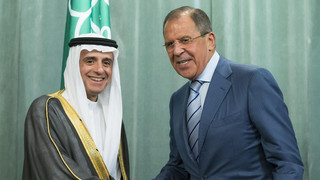By Shehab Al Makahleh •
The Middle East and North Africa (MENA) region is experiencing a fundamental geopolitical transformation which has pushed both superpowers to get more involved in the affairs of the MENA region. The frequent visits of both American and Russian officials to the region reflect the importance they attach to it. Between 9-11 September, Russian Foreign Minister Sergei Lavrov will visit Jordan as part of his tour to the Middle East region, which will later take him to
Riyadh, where he shall meet Saudi Foreign Minister Adel al-Jubeir and other senior Saudi officials.
The Syrian conflict will be the focus of Lavrov’s talks with both Jordanian and Saudi officials. From the Jordanian point of view, the ‘Amman Agreement’ between the United States, Russia and Jordan, signed last July to de-escalate the conflict in southwest Syria has survived all attempts at thwarting it. This has given credibility to Jordan’s ability to engage seriously and efficiently in the efforts restore peace in Syria.
The centrality of Jordan
There is no doubt that Jordan’s desire is clear and firm in achieving a ceasefire in the Syrian Badia region and to expand the ‘de-escalation area’ in southern Syria to include more villages adjacent to the Syrian border with Jordan, especially in Al-Hadhalat refugee camp (where more than 5,000 refugees reside). Any further escalation on this site would lead to the prospect of Jordan receiving a new wave of refugees.
This entails that Jordan supports the extension of the Syrian regular army to Al-Hadhalat, which is 70 kilometers away from Al Rughban Refugee Camp which accommodates more than 65,000 refugees on the border with Jordan. As regards the upcoming meeting, it is important that both the Jordanian and Russian foreign ministers raise the issue of forces that would be deployed on Jordanian borders in order to allay Amman’s concerns over the presence of Iranian forces or militias on the Jordan-Syria border.
The opening of the Turaibil crossing with Iraq on August 31 has been an encouraging development in that it has secured the crossings between the two countries from any sectarian militias or terrorist groups, thus creating the conditions for restoring economic activity and enabling the Iraqi government and later the Syrian government from fully controlling their borders after Jordan has been shouldering this burden on their behalf for many years.
Increased Russian role in Middle East
Lavrov’s visit to Amman and Riyadh cannot be viewed separately from his tour of Gulf countries which ended last month. That visit took Lavrov to Kuwait, the United Arab Emirates and Qatar. The Russian minister’s upcoming tour would also pave the way for royal visits from both Jordan and Saudi Arabia to Moscow. Russia has become more involved at present in affairs of the Middle East than ever before, more so since the surfacing of the Qatar-Gulf crisis. Since June 2017, Moscow has viewed the rift in the Gulf as having an impact on the Syrian conflict which entailed that Moscow coordinate the roles of regional players on the Syrian issue due to its good relations with many players such as Saudi Arabia and Turkey.
The repercussions of the Gulf crisis did not have a negative impact on Moscow’s plans in Syria, but attempts were made to expand the framework of expanding the ‘de-escalation zones’ with the assistance of Jordan, Turkey and Saudi Arabia in order to reach a political solution after seven years of war in the country. However, if the status quo in the Gulf crisis continues, Russians would proceed with their plans for Syria.
Syrian, Qatar crisis on Lavrov’s agenda
Lavrov’s previous Gulf tour and his three-day upcoming visit to Amman and Riyadh from 9-11 September are in line with Moscow’s coordination with Saudi Arabia, UAE, Kuwait and Jordan regarding Syrian developments. It is appreciated that the Jordanian-Syrian rapprochement will get a boost if Russia completes its consultations and talks with Gulf states based on military developments on the ground and the emerging political scenarios.
The Gulf crisis is not the only topic on the Russian agenda. Moscow seeks Saudi support for its projects in the arrangements to reduce tension in southern Syria after the great role of Moscow in this conflict. Lavrov, according to well-informed Jordanian sources, is looking to persuade Saudi Arabia to stop exerting its efforts with the parties concerned in the Syrian conflict to reach a political settlement.
Shehab Al-Makahleh is Director of Geostrategic Media Center, senior media and political analyst in the Middle East, adviser to many international consultancies.
Originally published by Al Arabiya English
_________________
Russian Foreign Minister, Sergey Lavrov, right, and Saudi Arabia Foreign Minister, Adel bin Ahmed Al-Jubeir, shake hands after a news conference following their meeting in Moscow, Russia, Tuesday, Aug. 11, 2015. Pressing to mediate the Syrian conflict, Russia on Tuesday hosted the Saudi foreign minister for talks that revealed their sharp differences about the fate of Syrian President Bashar Assad. (AP Photo/Alexander Zemlianichenko)
 Geostrategic Media Political Commentary, Analysis, Security, Defense
Geostrategic Media Political Commentary, Analysis, Security, Defense





